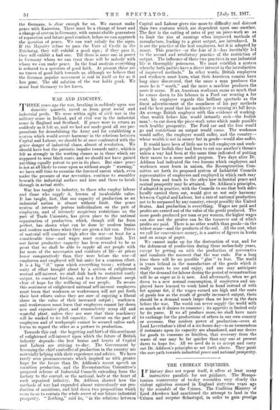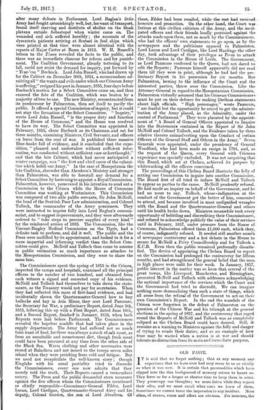THE CRIMEAN INQUIRIES.
I 1' history does not repeat itself, it offers at least many instructive parallels for our guidance. "The Mesopo- tamian controversy of to-day resembles very closely the violent agitation aroused in England sixty-two years ago by the scandals of the Crimea. The Coalition Ministry of Lord Aberdeen had sanctioned the attempt to land in the I"Crimea and surprise Sebastopol, in order to gain prestige after many defeats in Parliament. Lord Raglan's little Army-hadsfought astonishingly well, but, forwent of transport, found itself starving and destitute of shelter on the bleak- plateau outside. Sebastopol when winter. came on. The wounded and sick suffered horribly ; the accounts of the dysenteric_ patients arriving at. Scutari- in foul ships which were.. printed at that time were almost identical with the reports of Major Carter at Basra in 1915. W. H. Russell's letters to. the Times revealed the facts to the public, and there was an immediate clamour for reform and for punish- ment. The Coalition Government; already tottering to its fall, could not resist the demand for inquiry, put forward by " TrarJem " Roebuck. Lord John Russell, who had drawn up for the.Cabinet on December 30th, 1851, a memorandum ad- mitting all " the wants and evils under which our Crimean Army is suffering," resigned his post in January, 1855, four days before Roebuck's motion for a Select Committee came on, and thus ensured the fate of the Coalition, which was beaten by a majority of two to one. The new Ministry, reconstructed from- its predecessor' by Palmerston, then set itself to pacify the public. It offered a special Commission of inquiry, but it could not stay the formation of the-Select Committee. " Inquiry," wrote Lord John Russell, " is the •proper duty and function of the House of Commons," and the House was resolved to have its way. The Select Committee was appointed in February, 1855, chose Roebuck as its Chairman, and sat for three months, examining Ministers, Civil Servants, and officers en leave from the seat of war. It published three massive Blue-books full of evidence, and it concluded that the expe- dition, " planned and undertaken without sufficient infor- mation, was• conducted without sufficient care or forethought,'.' and that the late Cabinet; which had never anticipated a winter campaign, was " the first and chief cause of the calami- ties which befell our Army." In the case of Mesopotamia the late Coalition, shrewder than Aberdeen's Ministry and stronger than Palmerston, was able to forestall any demand for a. Select Committee by hastening to appoint a Royal Commission. Palmerston, however, persevered in his intention to send out a Commission to the Crimea while the House of Commons Committee was working at Westminster. This Commission was composed of two able public servants, Sir John McNeill, the head of the Scottish Poor Law administration, and Colonel Tulloch, the commander of the Army pensioners. They were instructed to inquire fully into Lord Raglan's commis- sariat, and to suggest improvements, and they were afterwards- ordered to ." take steps to procure- supplies of every kind " for the reinforced armies of 1855. The Commission, like the Vineent-Bingley Medioal Commission on the Tigris, had a definite task to perform, and did it well. The public and the were mollified by its. appointment, and looked to it for a more impartial and informing verdict than the Select Com- mittee could give. McNeill and Tulloch thus came to assume- in public estimation as much importance as attaches to the Mesopotamian Commission, and they were to share the same fates
The Commissioners spent the spring of 1855 in the Crimea, inspected the camps and hospitals, examined all the principal officers to the number of two hundred, and obtained from each witness a signed and corrected copy of his evidence. McNeill and Tulloch had.themselves to take down the state ments, as the Treasury would not pay for secretaries. When they-had collected this mass of first-hand evidence, and had incidentally shown the Quartermaster-General how to buy bullocks and hay in Asia Minor, they sent Lord Panmure, the Secretary for War, a preliminary Report, dated June 9th, 1855, following this up with a First Report, dated June 10th, and a Second Report, finished'in January, 1856, when both Reports were laid before Parliament. The Commissioners revealed the hopeless muddle that had taken place in the supply department. The Army had suffered not so much from want of food, for there was always a stock of salt meat, as from an unsuitable and monotonous diet, though fresh •meat could have been procured at any time from the other side of the Black Sea. Warm clothing and other necessaries were stored at Balaclava and not issued to the troops seven miles inland when they were perishing from cold and fatigue. But we need not recapitulate the well-known story ; though Kinglake with his usual partiality tried to discredit the Commissioners, every one now admits that they merely told the truth. Their Reports caused a tremendous. outcry. The Press and the public demanded stern measures against the five officers whom the Commissioners mentioned as chiefly responsible—Commissary-General Filler, Lord Lucas, Lord Cardigan, Quartermaster-General Airey and his deputy, Colonel Gordon, the son. of Lord Aberdeen. Of these, Fader had been recalled, while• the reef- had received• honours and promotion. On.the other hand, -then Court was . furious at this- civilian criticism of the Army, and the incul-
pated officers and their friends_ protested -against the attacks made upon them, not so much by the Comuussionees, who had the officers'. own statements to go upon, as by the newspapers. and the politicians opposed to Palmerston. Lord Lucan and Lord Cardigan, like Lord Hartlinge the other day, took advantage of their privileges as Peers to attack the Commission in. the House of Lords. The Government, as Lord Panmure confessed to the Queen, had not dared to edit the Reports ; Panmure himself apparently did not read them till they were in print; although he had had the pre- liminary Report in his possession for sir months. But Palmerston, bowing to the influence of the Court and the- interested parties, threw over the Commission, Like the Attorney-General in regard to the Mesopotamian Commission, Palmerston virtually. assumed that his Crimean Commissioners must be put on their defence for making libellous statements about high officials. " High personages," wrote Panmure, " are fearful lest the opportunity be seized to get the adminis- tration of the Army placed, as the Admiralty, under the control of Parliament." They were placated by the appoint- ment of " A Board of General Officers appointed to Inquire into the Statements contained in the Report of Sir John McNeill and Colonel Tulloch, and the Evidence taken by them relative thereto animadverting upon the Conduct of certain Officers of the General Staff and Others in the Army." Seven Generals were appointed, under the presidency of General Woodford, who had been made an ensign in 1794, and, at the request. of the Queen, every General with Crimean experience was specially excluded. It was not surprising that this Board, which sat at Chelsea, achieved its purpose by whitewashing all the officers concerned.
The proceedings .of this Chelsea Board illustrate the folly of setting one Commission to inquire into another Commission. The Board first of all tried to induce McNeill and Tulloch to appear as parties to the cause. McNeill prudently refused. He had made an inquiry on behalf of the Govermnent, and he had no more to say. Tulloch, whosesindignation • at the conduct of the Government got the better of him, consented to attend, and became involved in most undignified wrangles with the Board and the Quartermaster-General and others until his health broke down. Ministers meanwhile took every opportunity of belittling and discrediting their Commissioners, and refused to acknowledge publicly the value of their services until in February, 1857, under pressure from the House of Commons, Palmerston offered them £1,000 each, which- they, of course, indignantly refused. It needed still another month of newspaper controversy and a hot debate in the House to secure for McNeill a Privy Councillorship and for Tulle& a X.C.B. Even then the public remained profoundly dissatis- fied. The device of appointing_ the Chelsea Board to report on the Commission had prolonged the controversy for. fifteen. months, and had strengthened the general 'belief that the men. in high places were unfit for their work. In January, 1857, public interest in the matter was so keen- that several of the great towns, like Liverpool, Manchester, and Birmingham, presented McNeill and Tulloch with addresses acknowledging the national importance of the services which the Court and the Government bad tried to discredit. We can imagine nothing more demoralizing than such a state of things,' which all arose from the refusal of the Government to act on their. own Commission's Report. In the end the scandals of the- Crimea were forgotten in the defeat of Palmerston on the question of the Chinese War and his triumph at the general elections in the-spring of 1857, and the controversy that raged round the Reports of McNeill and Tulloch was as completely eclipsed as the Chelsea Board could have desired. Still, it' remains as.a warning to Ministers against the folly and danger of trying_ to evade their duties, and as an example of how time may be wasted when a nation is at war and should tolerate no distraction from its milli and inintsdiate purpose.



























 Previous page
Previous page